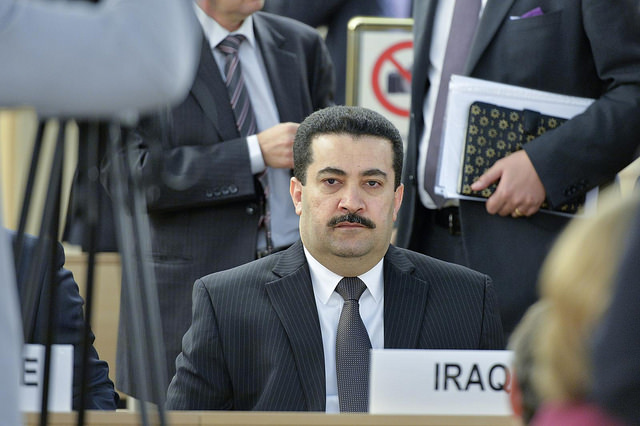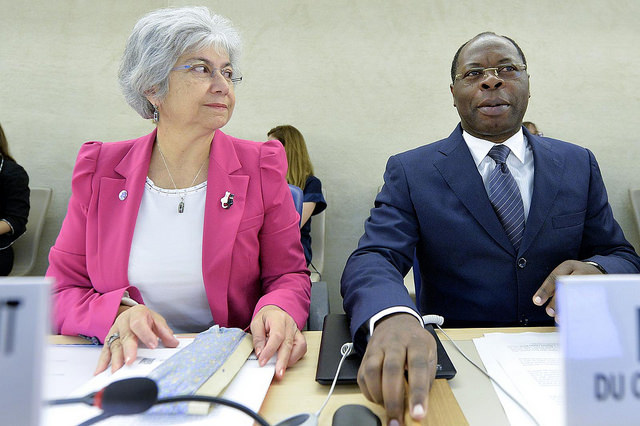
Credit: UN Photo / Jean-Marc Ferré
The United Nations Human Rights Council held its 22nd special session this week to address human rights violations committed by the Islamic State and associated groups, which have been accused of mass atrocities as they move to take territory and eliminate minority groups in Iraq and neighboring countries. [OHCHR; Amnesty] The UN Human Rights Council adopted a resolution requesting the Office of the High Commissioner for Human Rights (OHCHR) to deploy an emergency fact-finding mission to Iraq in order to investigate human rights abuses committed by the Islamic State and to provide technical assistance to the government. The High Commissioner for Human Rights should provide the Human Rights Council with an oral update on the resolution’s implementation later this month. See UN Human Rights Council, Draft Resolution S-22/ . . . , The human rights situation in Iraq in the light of abuses committed by the so-called Islamic State in Iraq and the Levant and associated groups, UN Doc. A/HRC/S-22/L.1, 1 September 2014.
Abuses by Islamic State
The Islamic State has been designated as a terrorist organization and its fighters have been engaged in battle to seize territory, in Iraq and then Syria, since 2006. [CNN] In that time it has taken on different names and stated goals; the United Nations refers to the organization as “the Islamic State in Iraq and the Levant” (ISIL), while other sources refer to the group as “the Islamic State in Iraq and Syria” (ISIS) or as “the Islamic State” (IS). The term “Levant” connotes territory beyond Iraq and Syria, as it refers to the area ranging from Southern Turkey to Egypt, including Syria, Jordan, Israel, the Palestinian territories, and Lebanon. [Associated Press; BBC]
Regardless of the acronym used, this group has targeted Christian, Yezidi, Turkmen, Shabak, Kaka’e, Sabaeans and Shi’a communities in its purported quest to establish , causing over one million people to flee their homes for fear of persecution. [OHCHR] Flavia Pansieri, the United Nations Deputy High Commissioner for Human Rights, stated that these affected groups are “intentionally and severely deprived of fundamental rights” due to their ethnic and religious identity, which is “a crime against humanity under international law.” [OHCHR] IS has engaged in widespread massacres, forced conversions, slavery, abductions, and destruction of places of worship. [OHCHR; BBC] IS’s actions may amount to ethnic and religious cleansing, war crimes, and crimes against humanity. [OHCHR]
The Human Rights Council’s Resolution

Credit: UN Photo / Jean-Marc Ferré
With this backdrop, the UN Human Rights Council held its special session on September 1 at the request of Iraq, 29 Council Member States, and 29 Observer States. The States engaged in a debate condemning the widespread human rights violations. [OHCHR] Leila Zerrougui, the Special Representative of the Secretary-General for Children and Armed Conflict, stated that 693 child casualties had been reported in 2014, explaining that young boys are being recruited and trained as combatants and suicide bombers, while young girls are abducted for sexual violence and forced marriage. [OHCHR] Ms. Zerrougui stated that half of the 1.2 million displaced individuals were children. [OHCHR]
The UN Human Rights Council adopted its resolution without a vote, requesting the Office of the High Commissioner of Human Rights (OHCHR) to dispatch a fact-finding mission to Iraq to investigate alleged human rights violations committed by ISIL and associated groups. See UN Human Rights Council, Draft Resolution S-22/ . . . , The human rights situation in Iraq in the light of abuses committed by the so-called Islamic State in Iraq and the Levant and associated groups, UN Doc. A/HRC/S-22/L.1, 1 September 2014. The OHCHR has a Rapid Response Unit, which “swiftly deploy[s] personnel” to investigate serious allegations of human rights violations and establish the facts and circumstances surrounding the abuses. [OHCHR] The OHCHR will send an 11-person team to investigate the abuses, with a budget of $1.18 million. [NY Times; Reuters]
The resolution requires the OHCHR to provide the UN Human Rights Council with an oral update during the Council’s 27th session and to submit a written report on the mission’s findings during the Council’s 28th session. The 27th Session will be held from September 8 through 26, and the 28th Session will likely be held in March. [OHCHR]
The resolution called upon the international community to provide humanitarian assistance to displaced individuals and to strengthen efforts in “assisting Iraq in restoring peace, stability and security.” See UN Human Rights Council, Draft Resolution S-22/ . . . , The human rights situation in Iraq. Mohammed Shyaa Al-Sudani, the Minister of Human Rights of Iraq, stated that IS’s crimes amounted to genocide and crimes against humanity, stressing that IS is not an Iraqi phenomenon, but rather a transnational organization that poses a threat to all countries in the world. [OHCHR]
The Council’s resolution has been criticized for limiting the investigation to those abuses committed by IS and terrorist groups, rather than including abuses allegedly committed by the Iraqi Security Forces (ISF). Chaloka Beyani, the Chairperson of the Coordination Committee of the UN Special Procedures, stated that reports suggest the ISF have been involved in grave violations of the right to life, including the killing of detainees and deaths due to the shelling of civilian areas. [OHCHR] Human Rights Watch has called for a resolution that includes “independent investigation into abuses committed by all sides to the conflict.” [HRW] After the special session, Mohammed Shyaa Al-Sudani said that Iraq’s government will investigate instances of abuse by ISF. [NY Times]
Nongovernmental organizations and human rights bodies contributed to the special session, condemning IS’s actions and urging the UN Human Rights Council to take further action to address the human rights abuses. Amnesty International stated that the Council should demand that Iraqi authorities “rescind discriminatory policies and practices to prevent recurring violations.” [OHCHR] The Syriac Universal Alliance asked the Human Rights Council to urge the UN Security Council to adopt a resolution ensuring urgent humanitarian aid to those displaced in Iraq. [OHCHR] The African Commission on Human and Peoples’ Rights encouraged the UN Security Council to consider deploying a peacekeeping mission as well to “secure demilitarization” of Iraq. [OHCHR]
Other Efforts to Address Human Rights Violations in Iraq
Other UN human rights bodies have also addressed abuses committed by terrorist armed groups in Iraq. In addition to encouraging the Human Rights Council to create a commission of inquiry to investigate human rights abuses, the United Nations Committee on the Elimination of Racial Discrimination (CERD) used its early warning and urgent action procedures to issue a decision urging the UN Secretary General to suggest that the Security Council set up a peacekeeping force. [OHCHR] This would serve as a temporary measure to create a “safe zone,” protecting communities and allowing displaced persons to return. [OHCHR]
The UN Security Council recently passed multiple resolutions referring to IS and associated groups. One resolution extended the mandate of the United Nations Assistance Mission for Iraq (UNAMI) through July of 2015. See UN Security Council, Resolution 2169, UN Doc. S/RES/2169, 30 July 2014. UNAMI is a political mission that, inter alia, assists the government of Iraq with humanitarian and development efforts. [UN Iraq]
The Security Council also passed Resolution 2170, condemning recruitment to IS, and calling upon Member States to take measures to stop the flow of foreign terrorist fighters and to prevent the financing of terrorist acts. See UN Security Council, Resolution 2170, UN Doc. S/RES/2170, 15 August 2014.
While there is no active Human Rights Council “special procedure” focused specifically on Iraq (its mandate having ended in 2004), the human rights situation in the country continues to be monitored by other thematic procedures and several treaty bodies. See OHCHR, Iraq.
Relatedly, however, the UN Human Rights Council in 2011 established a Commission of Inquiry on Syria to investigate all alleged violations of international human rights law occurring there since March 2011. When the commission’s mandate ends, the Special Rapporteur on Syria will assume his mandate. [OHCHR]
